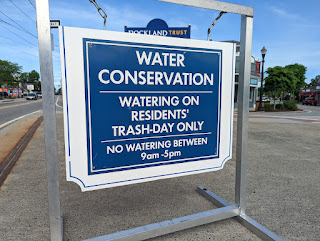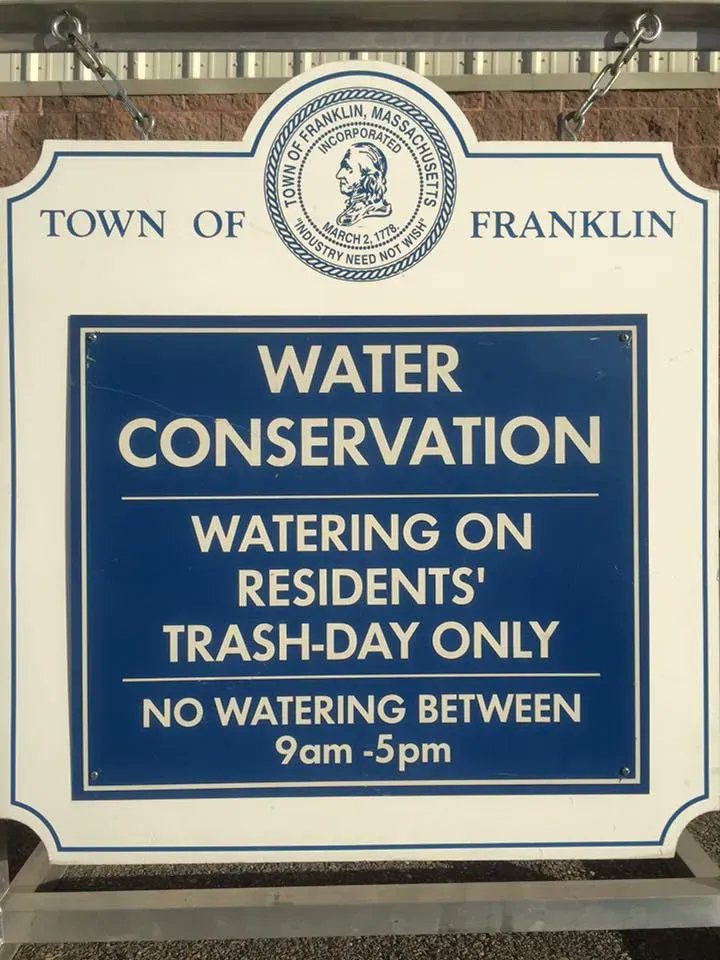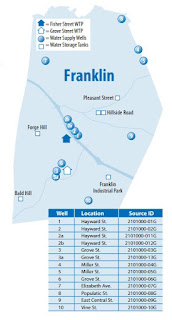|
| |||||
| |||||
 |
| Coming Soon: My360 Consumer Portal (view of WaterSmart login page) |
Providing accurate and timely information about what matters in Franklin, MA since 2007. * Working in collaboration with Franklin TV and Radio (wfpr.fm) since October 2019 *
|
| |||||
| |||||
 |
| Coming Soon: My360 Consumer Portal (view of WaterSmart login page) |
FM #1557 = This is the Franklin Matters radio show, numbers 1557 in the series
This session of the radio show shares my conversation with Doug Martin, Franklin’s Water and Sewer Superintendent and Jake Standly, the Assistant Water/Sewer Superintendent.
We had our conversation in the Franklin Public Radio studios on Hutchinson St on Tuesday, October 21, 2025. Our conversation covered updates on Water & Sewer projects previously discussed in each their own three-part series.
The show notes include links to the Franklin water & sewer division page
Let’s listen to this part of my conversation with Doug and Jake and learn about the updates to Franklin’s sewer and water projects.
---------------------
 |
| monitor your water usage |
Water Sewer Division - https://www.franklinma.gov/water-sewer-division
The main page contains links to the both of the 3-part series on water and sewer.
Beaver Street interceptor project -> https://www.franklinma.gov/557/Beaver-Street-Interceptor-BSI-Project
Charles River Pollution Control (sewerage processor) https://www.franklinma.gov/charles-river-pollution-control and https://www.charlesriverpcd.org/
Leak or Blockage diagram of lines of responsibility between Town and property owners for water and sewer service https://www.franklinma.gov/water-sewer-division/pages/have-leak-or-blockage
Water service line inventory page (looking for lead pipes and connections) -> https://www.franklinma.gov/637/Water-Service-Line-Inventory
Water Smart program -> https://www.franklinma.gov/1221/WaterSmart
Consumer Confidence Reports (on water quality) -> https://www.franklinma.gov/water-sewer-division/pages/consumer-confidence-reports
The Energy and Environmental Affairs Drinking Water Data Portal.
https://eeaonline.eea.state.ma.us/portal#!/search/drinking-water/results?PWSId=2101000
We did forget to cover the wholesale water program. It was suspended once the drought alerts from the State were issued. When not in drought, it does generate some additional revenue (more per gallon than residents pay) https://www.franklinma.gov/1109/Wholesale-Water
-----------
We are now producing this in collaboration with Franklin.TV and Franklin Public Radio (wfpr.fm).
This podcast is my public service effort for Franklin but we can't do it alone. We can always use your help.
How can you help?
If you can use the information that you find here, please tell your friends and neighbors
If you don't like something here, please let me know
Through this feedback loop we can continue to make improvements. I thank you for listening.
For additional information, please visit Franklinmatters.org/ or www.franklin.news
If you have questions or comments you can reach me directly at shersteve @ gmail dot com
The music for the intro and exit was provided by Michael Clark and the group "East of Shirley". The piece is titled "Ernesto, manana" c. Michael Clark & Tintype Tunes, 2008 and used with their permission.
I hope you enjoy!
------------------
You can also subscribe and listen to Franklin Matters audio on iTunes or your favorite podcast app; search in "podcasts" for "Franklin Matters"
 |
| Water ban in effect, warnings being made to violators |
 |
| Boston Globe: "Drought conditions worsen across New England, especially up north." |
 |
| Have you seen the Town of Franklin annual water quality report ??? |
 |
| Drought Update: MA at "Level 3-Critical Drought" |
Drought Update: Despite the recent rain and snow, most of Massachusetts remains in a Level 3-Critical Drought. The Cape and Islands Region have been raised to a Level 1 - Mild Drought.
Find water conservation tips here - https://t.co/cNHXAEdPFQ
Shared from -> https://t.co/Y1a9t0BqiY
Climate change is reshaping our region's weather patterns, resulting in warmer & drier fall and winter seasons.
Water conservation is more important than ever.
We urge municipalities, residents, and businesses to help us reduce stress on our water systems. https://t.co/gi7QUbr0ZS or https://www.mass.gov/conservemawaterShared from -> https://x.com/EEASecretary/status/1858930953323778388
 |
| Water conservation is more important than ever |
via the Water Department of the DPW:
WaterSmart Update:We have updated our water meter reading collection system and for about 50% of the Town we are now collecting hourly water readings.
WaterSmart was updated last week with this hourly information causing high use water notifications to be sent out.
The notifications are based on a comparison to prior usage and since there was no prior hourly usage before last week the system saw a big jump causing the notifications to be sent out. As the data continues to be populated in WaterSmart you will be able to set your WaterSmart notifications based on this new data.
Please track your usage over the next 2 weeks using WaterSmart and if you still have concerns after the 2 weeks please call the DPW Admin office (508-553-5500) to schedule a meter appointment.
We encourage everyone to sign into WaterSmart, check your account, and update your notification settings.
 |
| example report from our residence since we moved in |
"Franklin Residents ~ In accordance with the Town’s Water Management Act Permit Water Conservation Restrictions have ENDED.Residents are always encouraged to protect the future of our national and local water supply through water-efficient practices within your home and daily habits.Please see our website for more information:Thank you for your cooperation!"
 |
| DPW shares Think Blue Massachusetts' advice: "Do your doody" |
One day per week outdoor watering. Outdoor watering using sprinklers or automated irrigation systems is restricted to the water user's trash day. If the user does not have Town trash service, the user should water on the same day as the nearest Town trash customer.
Outdoor watering is prohibited between the hours of 9:00 a.m. and 5:00 p.m.
No Holiday Delays for watering.
No lawn watering is permitted on other days of the week.
Hand watering is permitted anytime.
Please see our website for more information: https://www.franklinma.gov/water-sewer-division/pages/water-conservation
Thank you for your cooperation!
Shared from -> https://www.franklinma.gov/home/news/franklin-residents-accordance-town%E2%80%99s-water-management-act-permit-water-conservation
 |
| Water Conservation Measures Go In To Effect, Monday, June 3, 2024 |
 |
| post card announcing the water quality report |
In accordance with the Town's Water Management Act Permit issued by the State, the following Water Conservation Measures are in effect as of Monday, June 5, 2023.
Conservation measures are needed to limit the daily demand on the water system in order to ensure that adequate water is available to meet the public health and safety needs of the Town. This measure is necessary to maintain the water levels in the tanks for fire protection and normal consumption. During the summer months, the Town experiences excessively high demands for water due to lawn watering. There have been 24- hour periods during which water consumption has been more than twice our average daily water usage for the year. Because of the tremendous increase in the demand for water and State restrictions on the amount of water that can be pumped daily, the Town of Franklin must place mandatory water conservation measures in effect for lawn watering during the summer months. A total of 1-inch of water once per week from rain and watering promotes the healthiest lawns.
Conservation measures will stay in effect until the second Monday in September (September 11, 2023) unless a drought condition is present.
Non-compliance with these regulations could adversely affect public health and safety. Violators are subject to fines up to $200.
For additional information, visit the DPW website at www.franklinma.gov/public-works. Any questions should be directed to the Department of Public Works at 508-520-4910.
Shared from -> https://www.franklinma.gov/home/news/dpw-notice-water-conservation-measures-now-effect
 |
| DPW Notice - Water Conservation Measures Now in Effect |
Attention Water Customers - Please see the public notice below:
This is NOT a boil water notice. During routine sampling, the sample from our Well 2 Raw (UNTREATED) water contained E.coli. The treated (disinfected) water from Well 2 and all other samples collected through the distribution system did not have E. Coli. The well has been offline since November 18, 2022 for maintenance and will remain offline.
This is not an emergency, you do NOT need to boil your water or take other corrective actions at this time, but we are required to notify you. Please see the notice below for more information.
----------------------
DRINKING WATER NOTICE To all users of the Franklin Water Department Located in Franklin, Massachusetts. This is an important notice – please translate it for anyone who does not understand English.We routinely monitor for the presence of drinking water contaminants to ensure the safety of the water supply. On November 21, 2022 our water system was notified that a water sample collected on November 15, 2022 from Well #2 tested positive for E.coli, which is a fecal indicator. Fecal indicators are used to detect ground water sources that may be susceptible to fecal contamination which may contain harmful viruses or bacteria. This well was taken off-line for maintenance on November 18, 2022.
The water delivered to your taps through the distribution system is disinfected with chlorine to kill viruses and bacteria, including E.coli. It is important to note that samples collected on November 15, 2022 in the distribution system did NOT detect any fecal contaminants.
This source is one of thirteen active wells that supplies drinking water to our system. In accordance with the federal Ground Water Rule (GWR) requirements, we are notifying you of the situation and conducting additional sampling to evaluate the extent of potential fecal contamination and will take further actions as necessary.
What should you do? What does this mean?
This is NOT an emergency, you do not need to boil your water or take other corrective actions at this time.The well will remain offline for further evaluation. Our system is undergoing repeat testing and evaluation to determine if the current level of treatment is adequate or if additional corrective actions are necessary to reduce the risk of potential fecal contamination in our drinking water supply. We are in contact with MassDEP during this process who will evaluate the effectiveness of the steps taken and determine if any further action is required. If necessary, you will be notified again if you need to take any corrective actions. This notice does not affect persons using private drinking water wells.
 |
| where all the wells are located in Franklin |